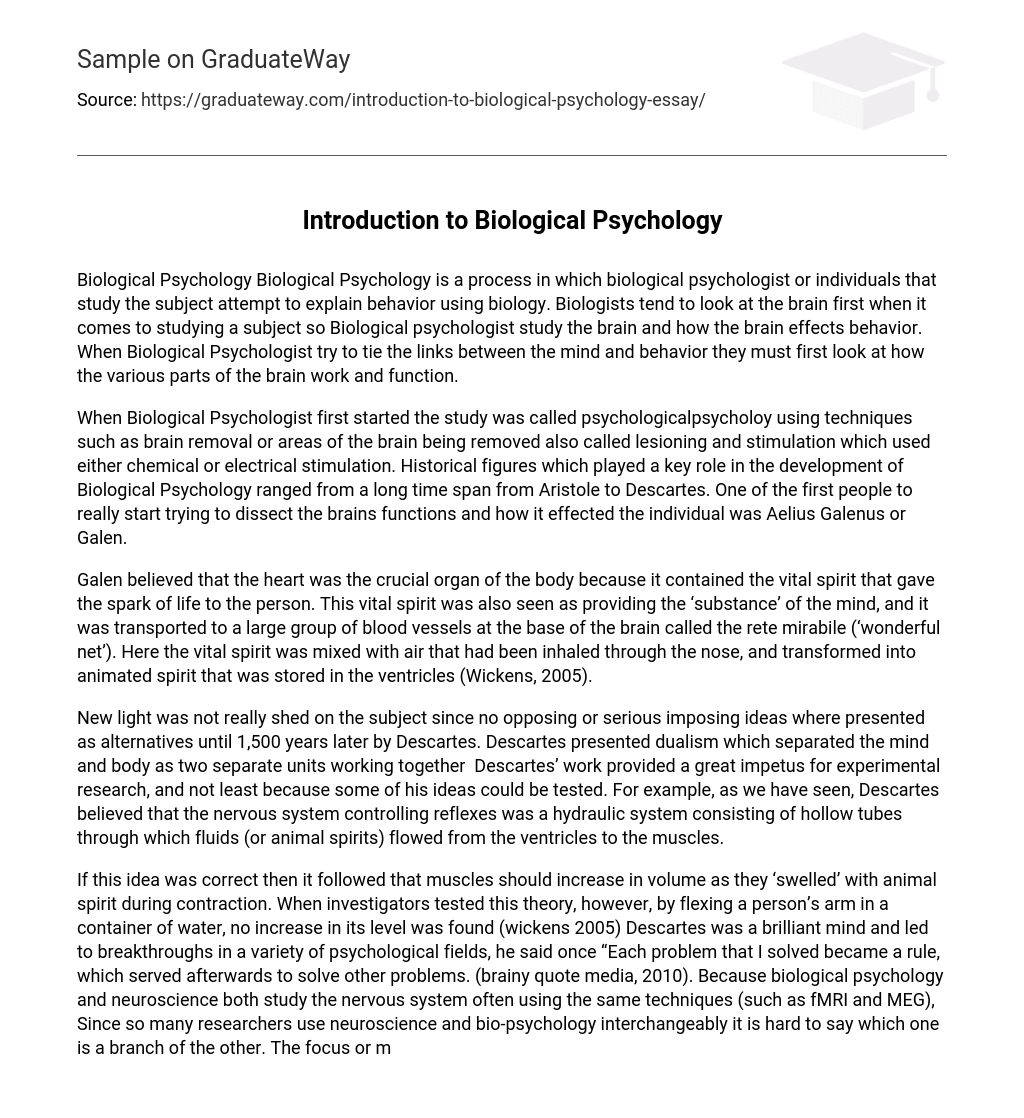Biological Psychology Biological Psychology is a process in which biological psychologist or individuals that study the subject attempt to explain behavior using biology. Biologists tend to look at the brain first when it comes to studying a subject so Biological psychologist study the brain and how the brain effects behavior. When Biological Psychologist try to tie the links between the mind and behavior they must first look at how the various parts of the brain work and function.
When Biological Psychologist first started the study was called psychologicalpsycholoy using techniques such as brain removal or areas of the brain being removed also called lesioning and stimulation which used either chemical or electrical stimulation. Historical figures which played a key role in the development of Biological Psychology ranged from a long time span from Aristole to Descartes. One of the first people to really start trying to dissect the brains functions and how it effected the individual was Aelius Galenus or Galen.
Galen believed that the heart was the crucial organ of the body because it contained the vital spirit that gave the spark of life to the person. This vital spirit was also seen as providing the ‘substance’ of the mind, and it was transported to a large group of blood vessels at the base of the brain called the rete mirabile (‘wonderful net’). Here the vital spirit was mixed with air that had been inhaled through the nose, and transformed into animated spirit that was stored in the ventricles (Wickens, 2005).
New light was not really shed on the subject since no opposing or serious imposing ideas where presented as alternatives until 1,500 years later by Descartes. Descartes presented dualism which separated the mind and body as two separate units working together Descartes’ work provided a great impetus for experimental research, and not least because some of his ideas could be tested. For example, as we have seen, Descartes believed that the nervous system controlling reflexes was a hydraulic system consisting of hollow tubes through which fluids (or animal spirits) flowed from the ventricles to the muscles.
If this idea was correct then it followed that muscles should increase in volume as they ‘swelled’ with animal spirit during contraction. When investigators tested this theory, however, by flexing a person’s arm in a container of water, no increase in its level was found (wickens 2005) Descartes was a brilliant mind and led to breakthroughs in a variety of psychological fields, he said once “Each problem that I solved became a rule, which served afterwards to solve other problems. (brainy quote media, 2010). Because biological psychology and neuroscience both study the nervous system often using the same techniques (such as fMRI and MEG), Since so many researchers use neuroscience and bio-psychology interchangeably it is hard to say which one is a branch of the other. The focus or main assumptions of bio psychology is that Mental events cause biological consequences. Strong emotional events can theoretically have a biological impact on the brain.
It is also believed that Biological events cause mental consequences the ideas is that biological and mental processes are both directly linked. There are some some researchers in the field of study believe that mental events are purely products of biology; however, most biopsychologists believe that the two cannot be separated. n REFERENCES Wickens, (2005). Foundations in Biospychology. : A pearson education company. brainy quote media. (2010). Brainy quote. Retrieved from http://www. brainyquote. com/quotes/authors/r/rene_descartes. html ———————– 3





